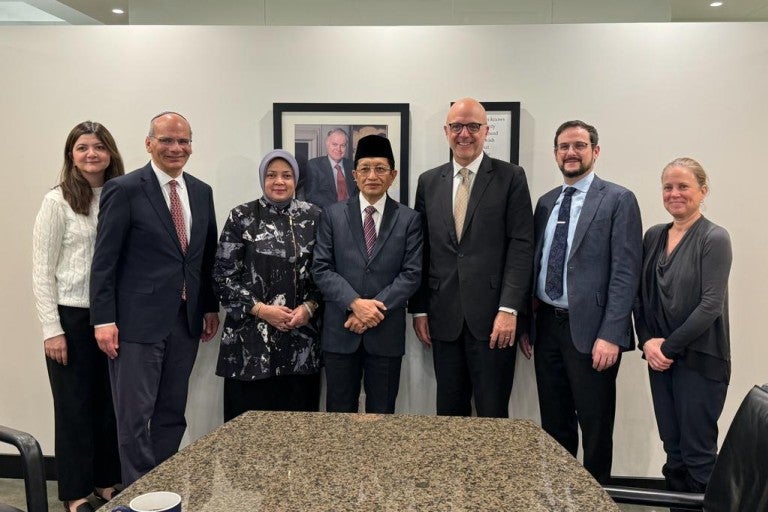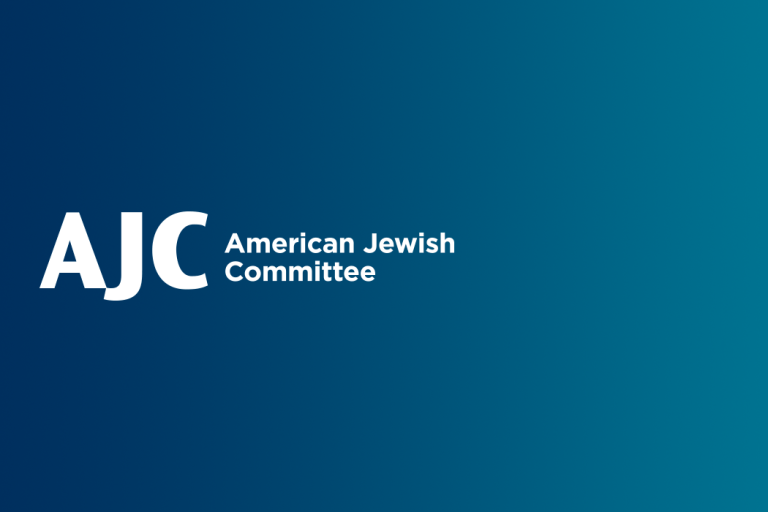July 28, 2022 — New York
An American Jewish Committee (AJC) leadership mission completed a week of consultations and public programs in Indonesia, a country with which the leading global Jewish advocacy organization has been engaged for two decades. The 17-member delegation included AJC CEO David Harris and professional and lay leadership of AJC’s Asia Pacific Institute (API) and Interreligious Affairs Department.
In Jakarta, Yogyakarta, and Makassar, the mission sought to strengthen U.S.-Indonesia ties, promote interfaith cooperation and advance deeper understanding of Judaism and the Jewish people. In several meetings with government officials, delegates also explored prospects for warming relations between Indonesia and the State of Israel.
“AJC knows the central importance of Indonesia to the Asia Pacific region and the Muslim world,” said API Director Shira Loewenberg. “We found a growing circle of friends and partners who want to engage with Jews along religious, political, cultural, and human dimensions.”
The nation of 280 million citizens is the fourth most populous country in the world and among the most diverse. While 87% of the country is Muslim, many religions are practiced by over 1300 ethnic groups on Indonesia’s 17,000 islands.
In addition to private meetings in each city, the AJC delegation also participated in interfaith events hosted by the Leimena Institute (LI), an Indonesian NGO dedicated to promoting pluralism. At the national Istiqlal Mosque (the largest mosque in Southeast Asia), Rabbi David Rosen, AJC Director of International Interreligious Affairs, addressed a public program on promoting mutual respect through education, alongside the Grand Imam of Istiqlal Mosque Sheikh Nasaruddin Umar and other national faith leaders. Introducing the event, former Indonesian Foreign Minister and LI Senior Fellow Dr. Alwi Shihab said, “Today we must move beyond interfaith dialogue to interfaith cooperation….All communities of faith command respect for one another, [but] this can only be achieved through education.” Following the program, the Grand Imam and Cardinal Ignatius Suharyo led the delegation on a joint tour of the majestic mosque and the adjacent National Cathedral.
AJC delegates joined a discussion on religious pluralism with LI, hosted by the governor of Yogyakarta, Sultan Hamengku Buwono X, and moderated by one of Indonesia’s leading theologians, Dr. Amin Abdullah. The Sultan later hosted the delegation and LI leadership for a state dinner featuring the traditional music, dance, and foods of the region. In welcoming the group, the Sultan said, “We believe that our brotherhood and sisterhood in humanity defies all difference, including in religion, geography, and distance.”
Over the course of the week the delegation deepened ties and discussed AJC priorities with over fifty of Indonesia’s leading politicians, journalists, religious figures, civil society activists, academics, and chiefs of industry. Among those the delegation met with were Dr. Abdul Mu’ti. Secretary General of the thirty-million-member Muhammadiyah organization; Siti Ruhaini Dzuhayatin, professor of law and human rights in Yogyakarta and Senior Advisor to President Joko Widodo; Dr. Theo Sambuaga, Co-Chair of the United States-Indonesia Society; and HE Sung Kim, U.S. Ambassador to Indonesia.
In recent years, AJC has offered a Jewish voice in several initiatives hosted by LI, including multi-faith virtual roundtables, as well as international webinars co-hosted by LI and the Indonesian Ministry of Religious Affairs. During this past year AJC experts have taught introduction to Judaism classes to Indonesian religious educators as part of a week-long certificate program in Cross-Cultural Religious Literacy (CCRL) hosted by LI. Since its launch in October 2021, LI’s CCRL training has reached over 2400 religious educators across 34 provinces of Indonesia.
At UIN Sunan Kalijaga—a leading State Islamic University and partner of LI in the CCRL program—the delegation participated in an interfaith roundtable program. After an opening dialogue about the parallel challenges of building social cohesion in the U.S. and Indonesia featuring Dr. Al Makin, Rector of UIN Sunan Kalijaga and Dr. Ari Gordon, AJC Director of Muslim-Jewish Relations, AJC delegates and Lemeina leadership explored opportunities for tangible cooperation with deans and faculty of the university’s many divisions.
The mission also included visits and consultations with several other educational centers, including the Indonesian Consortium for Religious Studies and the Center for Comparative Religious Studies at Gadjah Mada State Islamic University; Indonesian Muslim University in Makassar; the Maarif Insitute; the Indonesian Ulama Council in South Sulawesi; and several pesantren (boarding schools for traditional religious education).
Founded in 1989, API engages nations across the region and has staff representation in three Asian countries. API meets regularly with Indonesian diplomats and thought leaders, and was honored to host the late beloved President Abdurrahman Wahid (AKA Gus Dur), at the AJC Global Forum in 2002.
For over 116 years, advancing interreligious cooperation, promoting religious freedom, and combatting religious extremism have been central to AJC’s mission. AJC was instrumental in the revolution in Christian-Jewish relations during the twentieth century, and has made the transformation of Muslim-Jewish relations a pillar of its current agenda.
In Yogyakarta, the AJC delegation celebrated the historic mission at a traditional Shabbat dinner for Indonesian religious leaders, scholars, and interfaith activists with service, song, and thanksgiving.
“The opportunities for cross-cultural education, productive cooperation, and warming relations between Indonesian people and the Jewish people are enormous,” Rabbi Rosen commented. “The enthusiasm we have encountered is truly heart-warming.”


